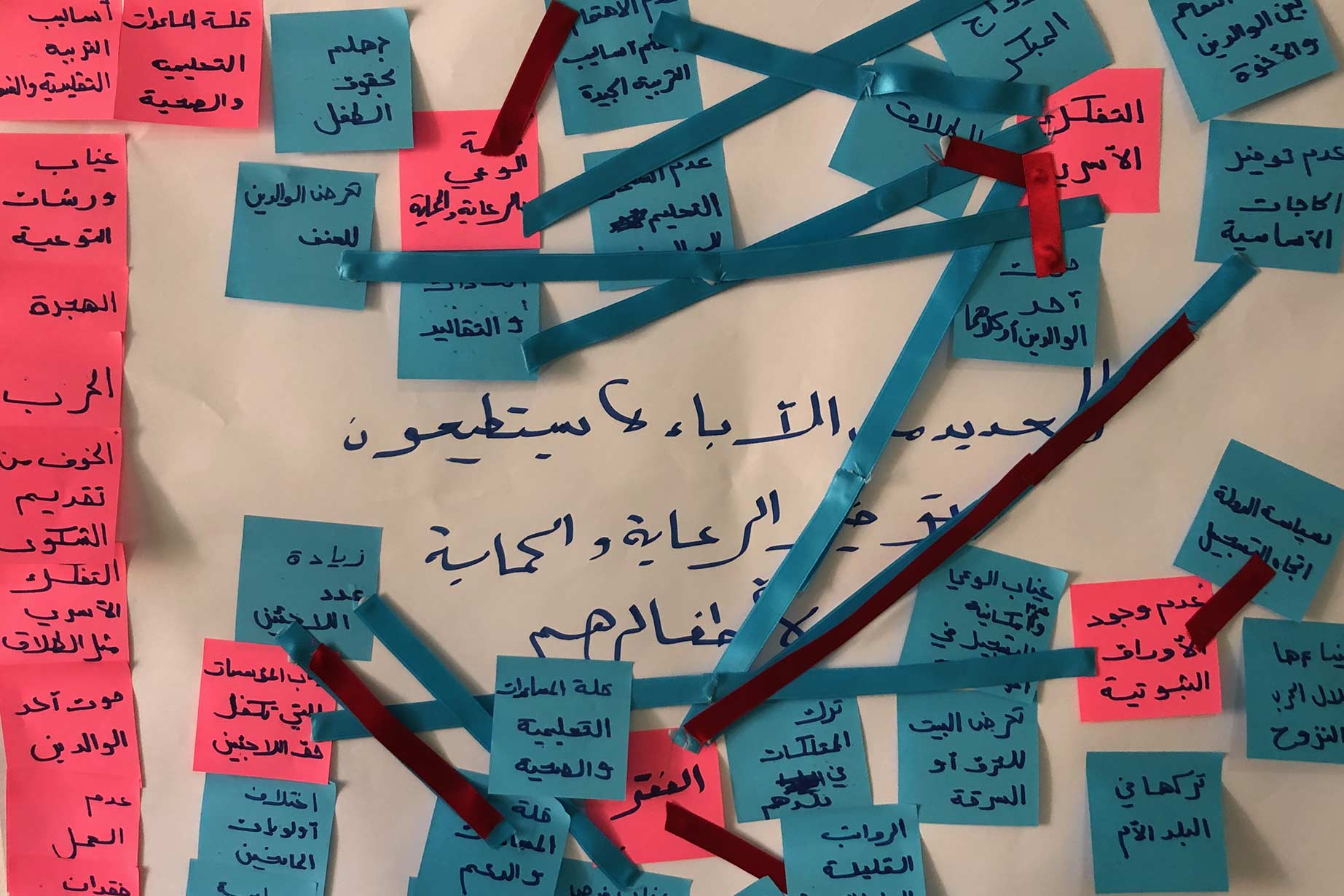
Read more
Blog, Public Attitudes
Why are Ukrainian refugees welcomed in Central and Eastern Europe?
The Russian invasion of Ukraine means that countries in Central and Eastern Europe are facing an unprecedented number of refugees crossing their borders. Poland, for instance, received around 100,000 refugees in the previous 30...
While calls to re-think, de-centre and de-colonise migration studies has started to trend, what does this mean in practical terms? This blog reflects on our experiences of developing social research training and working with Sudanese, Somalia, Syrian and Iraqi refugees in Jordan. We wanted to understand how communities living in contexts of displacement try to keep children and young people safe from harm. Our research has been developed, designed, conducted by refugees within their own communities, but we also encountered some of the pitfalls of our attempt to build a genuinely decentralised and non-hierarchical research praxis.
Decolonisation within migration studies is in large part about scholars reckoning with the reality that we are part of the migration governance systems so many of us critique, and finding ways to take responsibility for the ways that unequal professional, ethnic, racial and gendered positions are reproduced through our research. Following such an approach in migration research means fundamentally unravelling the hierarchies that structure research agendas – and directly addressing where and why existing research approaches may deepen existing unequal structures of power.
For us in our research to understand how refugee communities keep children safe in contexts of protracted displacement has meant addressing a key flaw in humanitarian child protection work that is still primarily based around a western construct of childhood. This means that little attention is paid to either how childhood is experienced in displaced communities or the parameters that refugee parents and caregivers are able to set around their children’s wellbeing.
Core to our research is an effort to find new ways of working, moving beyond participatory research tools and towards a decentralised and non-hierarchical research praxis. Working with two partner community-based organisations, we closely worked with a total of 24 ‘peer researchers’ to undertake a training programme in social research. The training covered different aspects of the research process: epistemological starting points; research design; ethics; development of data collection tools.
Following the training, the cohort of researchers designed and developed the research questions, interview guides, and other research tools; carried out the data collection (including semi-structured interviews and participatory workshops with refugee communities) with support from the research team based in Europe as requested.
Now in the latter stages of this work, we are working with the whole team to identify the main research themes, begin data analysis, and map out meaningful forms of research dissemination and advocacy in the community.
Limits on resources, time plus the restrictive nature of academic research grants can leave little space for genuine two-way capacity building. We, the researchers based at European academic institutions still trained the refugees who took part in this project on social research using methods that are epistemologically and methodologically western-centric. It is inevitable that the power dynamics will structurally favour the grant holder, usually a European institution/s.
Genuinely collaborative research praxis is not only about doing research together – by way of research design, data collection, analysis and dissemination – it is also about the work’s epistemological foundations; what we were collectively trying to achieve and why; and finding agreement on ethical and safety standards. Here is one example of where this project fell down.
What constitutes ethical praxis in research is always embedded in a broader politics, and navigating COVID-19 during in-person fieldwork was an example of how this played out in this study.
Our social research training was conducted in-person in Jordan, in summer 2021. Transmission rates in Jordan were still high at this time, and mask wearing was limited. Vaccine rates were picking up, but were still hovering around 12% of the population. We knew there was vaccine hesitancy in the communities we were working with, and that given the impossibility of social distancing in overcrowded refugee communities and the frequent inaccessibility of sanitiser, masks and often clean water, that it was impossible to adhere to many of the imposed public health measures anyway. In this context, the threat of the virus was not seen in the same light as other threats within these communities.
The team working at European institutions were adamant that we should maintain a strict COVID-19 protocol throughout the research, both to protect the participants who had agreed to take part in the research and the wider research team itself. This was seen as uncomfortable, unnecessary, and inappropriate by our peer researcher colleagues who lived in the same communities in which they were working as a part of this project.
Finding agreement on concepts of accountability and responsibility across different experiences of what constituted ethical and safe praxis took long and careful discussions. In the end, no ‘compromise’ was found, and the insistence of the researchers from European institutions (ourselves included) on maintaining strict covid measures prevailed overall. This was arguably as much about our own fears of accountability to donors and the safety and risk assessment challenges that might be prompted by not doing so, as it was about anything else.
This is one example of how ultimately, the perspectives and intentions of European institutions continued to dominate the project’s agenda. Any genuine effort to decentre research in migration studies means unravelling an enormous industry of knowledge production and activity, that predominantly originates in and is funded by the global north. This requires the development of research approaches that align with the perspectives of national actors, as well as explicitly linking the study of migration to broader epistemological debates of coloniality and empire.
During the training, several students explained their prior experience of researchers coming into their communities – using them as vehicles to gather data which would be analysed, produced and consumed elsewhere. They were tired and frustrated by these ways of working – rather than the ultimate goal of research projects themselves. Of course, we are not claiming here that we have successfully “done it”: we hit many stumbling blocks along the way. Rather, by developing this work, we are trying to contribute to an on-going conversation around fundamentally shifting research practices in migration studies for the future.
In our view, a less hierarchical field would be one that not only creates space for the voices of displaced communities in research, but is prepared to radically question and challenge our existing theoretical frameworks, ethics and risk processes and methodological choices.

